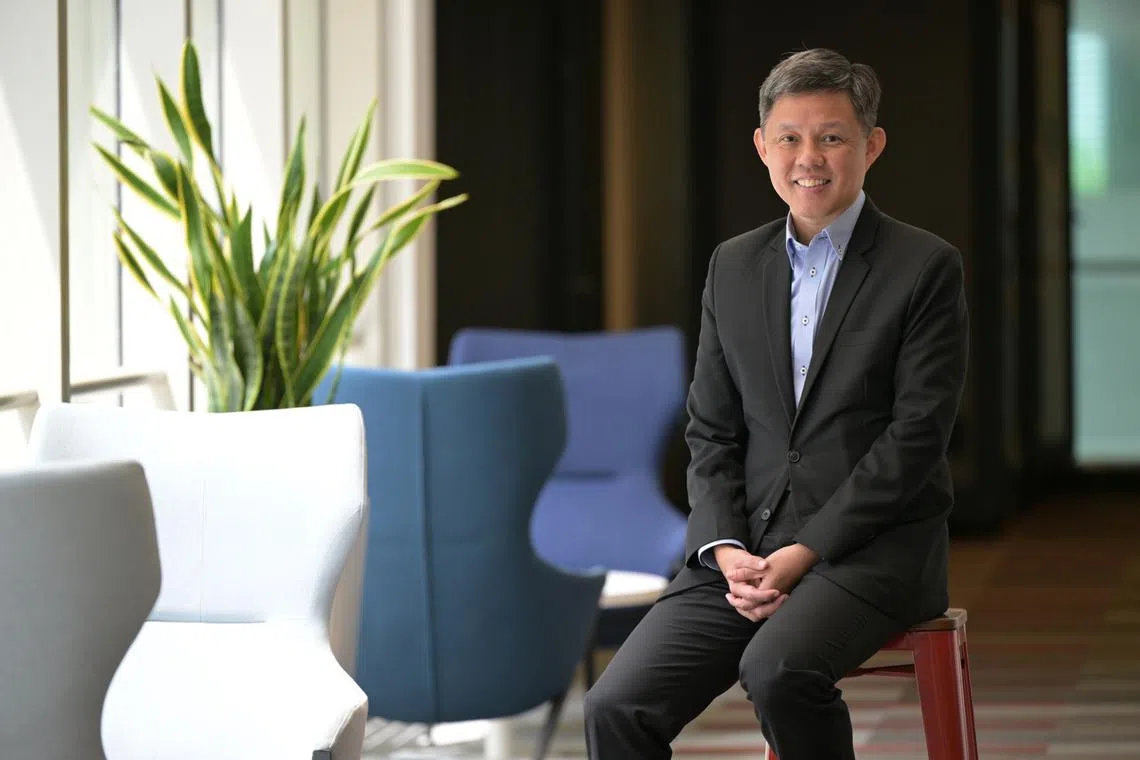Review of DSA scheme among MOE’s priorities for 2025: Chan Chun Sing
Sign up now: Get ST's newsletters delivered to your inbox

More details of the changes to the DSA scheme will be released in the second quarter of 2025, said Mr Chan Chun Sing during the two-hour session.
ST PHOTO: NG SOR LUAN
SINGAPORE - Learners of all ages will have more options as they navigate educational pathways that will best fit them, said Education Minister Chan Chun Sing.
These include a more accessible Direct School Admission (DSA) scheme, where pupils secure spots in schools based on their strengths in areas like sports and the arts, as well as more varied learning options such as work-study programmes.
This is what will move students from “good to great”, said Mr Chan, as he outlined the Ministry of Education’s (MOE) priorities for 2025, adding that it is not about increasing one’s test scores, but developing innate qualities and life skills.
“The ability to learn by yourself, discover things, create new value propositions are things we want to inculcate,” he said in an interview with The Straits Times ahead of the new school year.
These qualities will help them move beyond chasing traditional metrics of success, he said.
His ministry’s plans include a review of the DSA process as part of efforts to “strengthen the middle” and “stretch the top”, offering more options and tailored pathways for students.
More details of the changes to the DSA scheme will be released in the second quarter of 2025, said Mr Chan during the two-hour session.
Assessing skills is not as “black and white” as Primary School Leaving Examination or grade point average scores, Mr Chan said. “If you want broader metrics, you must accept that there’s some degree of judgment required.”
The PSLE scoring system is “very precise” but also “narrow”, he said.
Thus, the DSA system was introduced in 2004 to recognise talents in areas such as sports and the arts beyond academic achievements, allowing Primary 6 pupils to gain early admission into secondary schools with these strengths.
An ongoing review will result in changes to the scheme, said Mr Chan, with the aim of ensuring that schools focus on students’ development, the selection process remains objective and transparent, and DSA continues to be accessible.
The review is meant to tackle issues of “green harvesting”, the practice of identifying and recruiting young talent at an early age, he said. It aims to reduce the bias of favouring pupils with strong performance over untapped potential, which often stems from unequal access to professional training or academies.
“We will insist and encourage that if you have a DSA system in your school, you must demonstrate development,” he said, which means that the school should also be able to develop students in the same co-curricular activity who were not admitted through DSA.
He added that no school should have a team composed entirely of DSA students, as this does not show a school’s ability to nurture talent.
The school needs to show that it is good at the activity not just because of its pre-selected students, but its ability to cultivate potential across the board. “With the same system, you can also develop those who previously may not have been selected, which I think makes for a better system.”
The selection process will also look at identifying not just performance, but also potential, said Mr Chan. “You must not make the mistake of not selecting the people that should have been selected, and these are the people who maybe have the raw innate talent and potential, but didn’t get the chance to go for all the enrichment.”
This ties in with increasing accessibility to students who may not have the same training opportunities as their peers, Mr Chan said, which is why the ministry will be “intensifying” various programmes in primary schools for teachers to help “talent spot”.
Without going into details, he said teachers will work with parents to encourage them to enrol their children into these programmes, which could start when the pupil is in Primary 4 or 5.
Currently, about 6 per cent of students admitted to secondary schools by DSA are from low-income families, compared with 10 per cent for the general student cohort who come from such backgrounds, he noted.
Issues involving potential conflicts of interests will also be tackled, with more details on changes to come in 2025, said Mr Chan, as MOE continues to work with coaches and schools.
More importantly, it is about finding a school culture that best fits each student, he said.
It is sometimes better to place students in a comfortable environment or one where they are slightly above average, rather than in a stream or school where they are “at the bottom, because sometimes they may never climb out”, Mr Chan said.
Finding an environment that suits each student best, rather than to force the student to fit within a cut-off point, avoids this “small fish in a big pond” effect, he said.
“It is not about whether this school is a good school, but whether this school is a good school for your child,” he said, adding that every child is different.
Variety of pathways
Another priority in the new year will be to “personalise” learning for students, by challenging the top 10 per cent to 20 per cent of each cohort while supporting the middle 60 per cent, said Mr Chan.
There are many pathways for students to take, including work-study diplomas and degrees, and even customising their own majors in universities like the Singapore Management University, he said.
“Many people are not rushing to finish off a degree… We are seeing more variety in the kind of pathways that people take.”
Mr Chan added: “Instead of chasing the paper, more students know purposefully what their companies need.”
For the younger cohorts, the removal of exams was not solely aimed at reducing stress, he said, but more to “create time and space for people to learn”.
“Not everything that you learn needs to be tested,” said Mr Chan. “We really want to inspire the joy of learning, and the sense of being curious and inquisitive.”
He added: “Your ability to present these dispositions and skills are not through your conventional academic tests.”
Rather, it comes from “pushing” students beyond their grade point average, he said, citing examples of university students going overseas for exchange programmes where they learn and build connections.
More than content knowledge, students will also be pushed to learn more life skills, and given confidence to be themselves and to “know what makes (them) special”, he said.



